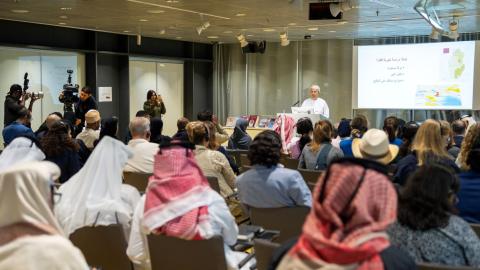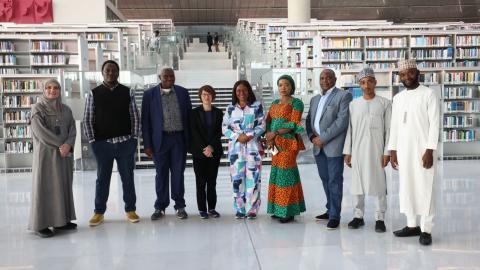
Hamad Bin Khalifa University Press (HBKU Press) and Qatar National Library (QNL) recently signed an agreement that funds and supports researchers from Qatar-based universities and institutions to publish their research freely as open access works. The published content funded by Qatar National Library will be made available in QScience Connect, HBKU Press’ multi-disciplinary, peer-reviewed online journal, hosted on QScience.com, or as open access monograph books.
“By working with Qatar National Library, we are able to provide affordable publishing solutions to local researchers who seek publication and a dedicated journal to disseminate local research regionally and internationally,” explains Dr. Rima Isaifan, Head of Academic and Journals Publishing at HBKU Press. “HBKU Press endeavors to consistently support the local academic publishing landscape. Through agreements like these, we are able to establish ourselves as a cornerstone of Qatar’s knowledge-based economy by providing a unique local and international platform for scholarship and discovery.”
Dr. Alwaleed Alkhaja, Senior Intellectual Property Librarian and Open Access Fund Manager at Qatar National Library, said: “We are committed to supporting the researchers of Qatar to publicize their findings as far and wide as possible. Wherever we can, we will support innovative scholars, creative thinkers and scientific pioneers to maximize the impact of their work across the world.
“Open access is one of our core values and working with partners like HBKU Press enables us to reach out to more Qatari scholars and help further their progression.”
Open access content is free to readers and patrons of academic libraries to access and read. The benefits of publishing open access research are many. The lack of subscription barriers allows research to be accessed by readers from low and high income countries alike; it increases the discoverability of the work which allows for more developments within the field and possible collaborations; and it increases citation and visibility for authors as there are no restrictions to downloading and reading these articles.
However, the cost of publishing open access varies and is sometimes exclusionary to researchers who are unable to fund the publication of their work. With open access, the charges associated with publishing scholarly communication have shifted from being paid by the end users or academic libraries to the authors/researchers themselves, which is not always possible.
For academic researchers, publishing a number of research papers annually is essential for career progression. However, without financial support, many researchers are simply unable to publish their work.
Qatar National Library is providing a solution to the financial barrier to publishing by making funding available for Qatar-based researchers to offset associated costs. It will provide financial support to authors with a restricted budget and pay the article processing charges associated with publishing their research. Authors are requested to make the funding request during the submission process to QScience Connect.
The final research will be made available to the global scholarly community in the QScience Connect journal, which is fully open access under HBKU Press. The journal publishes articles in English or in Arabic which are immediately and permanently available online. The articles in QScience Connect are licensed under the terms of the Creative Commons Attribution 4.0 International License (CC BY 4.0), which permits unrestricted use, distribution and reproduction of the content in any medium, provided that the original author(s) and source are credited. QScience Connect is indexed in the Directory of Open Access Journals (DOAJ), EBSCO and Google Scholar.
Interested authors and researchers who are affiliated with a graduate institution in Qatar and who would like to publish their work with HBKU Press with funding opportunities provided by Qatar National Library can send queries to [email protected]. For more information on HBKU Press’s academic online platform and its associated journals, please visit https://www.qscience.com .







